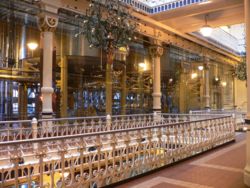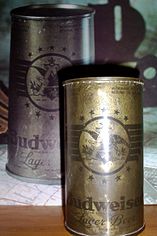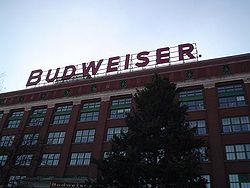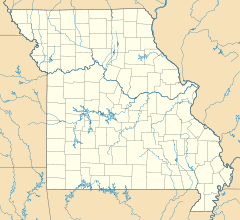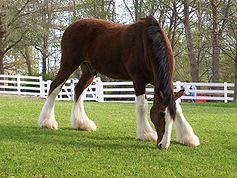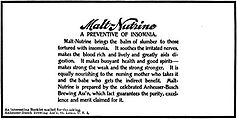- Anheuser-Busch
-
This article is about the business acquired by Anheuser–Busch InBev in 2008. For the parent company, see Anheuser–Busch InBev.
Anheuser-Busch Companies, Inc. 
Type Wholly owned subsidiary Industry Beverages and packaging Founded 1852, incorporated in 1875 Headquarters St. Louis, Missouri, U.S. Key people Dave Peacock (CEO)
Luiz Fernando Edmond (North American Zone President)Products Beers, lagers, malt beverages, energy drinks, bottled water Revenue  $16.7 billion (2007)
$16.7 billion (2007)Employees 30,849 (2007) Parent Anheuser–Busch InBev Website www.anheuser-busch.com Anheuser-Busch Companies, Inc. (pronounced /ˈænhaɪzər ˈbʊʃ/), is an American brewing company. The company operates 12 breweries in the United States and 18 in other countries. It was, until December 2009, also one of America's largest theme park operators; operating ten theme parks across the United States through the company's family entertainment division, Busch Entertainment Corporation. As a wholly owned subsidiary of Anheuser–Busch InBev, the regional headquarters are still located in St. Louis, Missouri.[1]
Contents
History
Beginnings
The brewery which would become Anheuser-Busch was purchased on the brink of bankruptcy by Eberhard Anheuser, a prosperous German-born soap manufacturer, in 1860.[2] Adolphus Busch, Anheuser’s son-in-law, joined E. Anheuser & Co. in 1864, becoming partner in 1869. Adolphus became president when Anheuser died in 1880, and the company then became Anheuser-Busch Brewing Association.[3] The Busch family would be in full control of the company through the generations until Anheuser-Busch's sale to InBev in 2008.[4]
Adolphus Busch initially toured Europe and studied the changes in brewing methods which were taking place at the time, particularly the success of Bohemian lager, which included a locally popular example brewed in Budweis.[2] In 1876, Busch introduced Budweiser, with the ambition of transcending regional tastes.[2]
Adolphus Busch was the first U.S. brewer to use pasteurization to keep beer fresh, the first to use artificial refrigeration and refrigerated railroad cars and the first to bottle beer extensively.[5] This ability to transport bottles made Budweiser America's first national beer brand, and it was marketed as a "premium" beer. At the time, the term "premium" applied to all nationally-distributed beers[2], and in 1896 the company introduced its "super-premium" brand Michelob, which is still marketed today as the higher-end line of AB products.[6]
20th Century
As with all breweries in the country, the Temperance movement and eventual Prohibition in the United States dealt a major blow to the company in the 1910s through the 1930s. Some of the products sold by Anheuser-Busch to survive during Prohibition included brewer's yeast, malt extract, ice cream, and Bevo, a nonalcoholic malt beverage.[3][7]
Anheuser-Busch became the largest brewer in the United States in 1957.
Anheuser-Busch International, Inc. was established in 1981, and is responsible for the company's foreign beer operations and equity investments. However, after the InBev takeover, A-BII essentially has been shut down and those respective operations were transferred to the other InBev zones where the interests are located.
As of 2008, it has 48.9% share of beer sales in the United States (by barrels),[8] and produces about 11 billion bottles and cans of beer a year.[citation needed]
Up until 2009, Anheuser-Busch was also one of the largest theme park owners/operators in the United States, with ten parks throughout the country through its entertainment division, Busch Entertainment Corporation. On October 7, 2009, parent company Anheuser-Busch InBev announced plans to sell the division to The Blackstone Group for up to $2.7 Billion USD.
Rare Olive Drab Budweiser Can
Acquisition by InBev
Main article: Anheuser-Busch InBevOn June 12, 2008, Brazilian-Belgian brewing company InBev announced that it had made a US$ 46 billion dollar offer for the company.[9] which if it was accepted would join two of the world's four largest brewing companies (based on revenue) and create a company brewing three of the highest grossing beers in the world, namely Bud Light, Budweiser, and Skol. InBev also stated that the merger would not result in any U.S. brewery closures and they would also attempt to retain management and board members from both companies.[10] On June 25, 2008, Anheuser-Busch officially announced that they would reject InBev's offer and provide a restructuring of company to maintain shareholders and United States World Headquarters in St. Louis.[11] On July 1, 2008, InBev urged Anheuser-Busch shareholders to vote in favor of the buyout as InBev felt the offer of $65 per share should be considered a reasonable offer in view of the falling stock market. The company had previously filed suit in Delaware, after the rejection of their offer, to ensure that the stockholders could oust Anheuser-Busch's 13 board members.[12] On July 7, 2008, Anheuser-Busch filed a lawsuit against InBev to stop them from soliciting support of shareholders, stating that the company's offer is an illegal scheme. InBev was also accused of concealing that they do business in Cuba, which might have created additional obstacles to their efforts to operate in the United States.[13]
On July 13, 2008, Anheuser-Busch and InBev said they had agreed to a deal, pending shareholder and regulatory approval,[14] for InBev to purchase the American icon at $70 per share, creating a new company to be named Anheuser-Busch InBev. Anheuser-Busch would get two seats on the combined board of directors. The all-cash agreement, almost $52 billion in total equity, created the world’s largest brewer, uniting the maker of Budweiser and Michelob with the producer of Beck's, Stella Artois, Hoegaarden, Leffe, Bass, Labatt and Brahma. The two companies had combined yearly sales of more than $36.4 billion, surpassing the current No. 1 brewer, London-based SABMiller.[15][16]
Changes introduced by InBev
On November 18, 2008, the acquisition was completed and the company is now known as Anheuser-Busch Inbev. Within six months, InBev "turned a family-led company that spared little expense into one that is focused intently on cost-cutting and profit margins, while rethinking the way it sells beer."[8] InBev is applying an approach that "stresses a sharp eye on costs and incentive-based pay structures" that it inherited from AmBev in a prior acquisition; among the changes:[8]
- 1,400 U.S. employees (6%) and 415 contractors were laid off
- introduced what InBev called an "increased focus on meritocracy" that means salaried workers receive a base salary that was supposed to be targeted at 80% to 120% of the market rate (though this has not turned out to be the case, with many employees earning well under 100%). The difference in Base Salary is offset with a bonus system, which can account for 15–50% of a person's salary.[citation needed]
- about 40 of its executives were granted a total of 28 million stock options, "potentially worth tens of millions of dollars to each recipient, if the company reduces its debt-to-income ratio by about half in five years"
- for senior management, elimination of executive assistants and private secretaries
- elimination of free beer program known as the Anheuser Busch Hospitality Houses and Brewmasters Club formerly located at the theme parks. However, the St. Louis Anheuser-Busch Brewery Tour as well as the Grant's Farm park in St. Louis county both offer free AB products to their guests. On October 7, 2009 Anheuser Busch InBev announced the sale of its Busch Entertainment Corporation theme park division to The Blackstone Group. The sale was complete on December 1, 2009 and the division was renamed SeaWorld Parks & Entertainment.
- announced it would end contributions to its pension plan for salaried employees in 2012
- "ornate executive suites" were replaced by a "sea of desks"[citation needed]
- the number of company-supplied BlackBerrys for employees cut from 1,200 to 720
- accounts payable terms lengthened to 120 days
- zero-based budgeting
- put its corporate jets up for sale
- announced that in January 2010, it will stop providing life insurance for retirees
- elimination of tuition reimbursement for all but its highest rated employees (those rated 4a and 4b)
These changes are also accompanied by changes in its advertising.
The changes continued in 2010, as Anheuser-Busch InBev:
- Continued with layoffs according to the St. Louis Post-Dispatch and employees (with more layoffs rumored to come)[17]
- Revamped their severance policy to require employees to sign away their rights to WARN pay before receiving severance
Breweries
In the United States, Anheuser-Busch operates 12 breweries. These are located in St. Louis, Missouri; Baldwinsville, New York; Cartersville, Georgia; Columbus, Ohio; Fairfield, California; Fort Collins, Colorado; Houston, Texas; Jacksonville, Florida; Van Nuys, Los Angeles, California; Merrimack, New Hampshire; Newark, New Jersey; and Williamsburg, Virginia.
St. Louis headquarters and brewery
See also: Alcohol laws of MissouriAnheuser-Busch BreweryThe packaging plant in St. Louis, MissouriLocation: 721 Pestalozzi
St. Louis, MissouriCoordinates: 38°35′51″N 90°12′44″W / 38.5975°N 90.21222°WCoordinates: 38°35′51″N 90°12′44″W / 38.5975°N 90.21222°W Area: 142 acres (0.57 km2)[18] Built: 1875 Architectural style: Romanesque Governing body: Private NRHP Reference#: 66000945 Significant dates Added to NRHP: November 13, 1966[19] Designated NHLD: November 13, 1966[20] Anheuser-Busch InBev's North American headquarters are located in St. Louis, Missouri. The brewery, opened in 1852, is a National Historic Landmark District, and includes three buildings listed as National Historic Landmarks. Free public tours of the brewery are given. The tour takes visitors through the complex, and those of the legal age can enjoy two free glasses of any Anheuser-Busch product in the Hospitality Room after the tour. Tourists can see beer being made and packaged in a working part of the brewery.
The company keeps a rotation of its famous Budweiser Clydesdales at its headquarters, and visitors to the brewery can observe the Clydesdales in their exercise field and see their places in the carriage house. Some of the herd is kept at the company farm in St. Louis County. The farm, known as Grant's Farm (having been owned by former President Ulysses S. Grant at one time), is home to a menagerie of animals such as elephants, tortoises, and a variety of exotic hooved mammals. Since 2008, approximately half of the Budweiser Clydesdales are kept at the Warm Springs Ranch near Boonville Missouri.
The brewery was designated a U.S. National Historic Landmark in 1966.[18][20] The landmarked area includes 189 structures spread over 142 acres (0.57 km2), including many red brick Romanesque ones "with square crenelated towers and elaborate details."[18] The Brew House, built in 1891-1892, is particularly notable for its "multi-storied hop chandeliers, intricate iron-work, and utilization of natural light".[18]
International operations
Anheuser-Busch, prior to the take-over, operated Anheuser-Busch International Inc. which handled the international operations (described below). After the InBev takeover, however, those specific interests and the management oversight of them has been transferred to those respective zones (Harbin, for example, is now managed by the Asia-Pacific Zone of A-B InBev). The following description of A-BII areas, therefore, is left here for historical purposes:
Outside the United States, Anheuser-Busch operates 15 breweries - 14 in China and one in the United Kingdom; In China, A-B operates Budweiser Wuhan International Brewing Company, Ltd. and Harbin Brewery Group Ltd which A-B fully acquired in 2004. Chinese production of AB products in China started, in Wuhan, after their purchase of a local brewery in 1997. In the United Kingdom, the Budweiser Stag Brewing Company Ltd. produces and packages Budweiser, but this brewery is due to close in 2010 as part of cost controls introduced following Anheuser-Busch's acquisition by InBev.[21]
Budweiser is also locally brewed in eight other countries: Argentina, Canada, Ireland, Italy, Japan, Russia, South Korea and Spain.[citation needed]
Anheuser-Busch strategic equity investments include:
- 50.2% of Grupo Modelo in Mexico[22]
- 7% of Tsingtao Brewery Company Ltd. in China[22] (19.9% was sold to Asahi; the remaining interest was sold to another group - as of April 2009, A-B no longer has a stake in Tsingtao)
- 34% of craft beer Redhook Ale Brewery[23]
- 40% of Widmer Brothers Brewery[23]
- 99.77% of Harbin Brewery[24]
Beverage products
Main article: Anheuser-Busch brandsAnheuser-Busch's best known beers include brands such as Budweiser, Busch, Michelob, Bud Light, and Natural Light. The company also produces more than 100 beers, import beers, specialty beers, nonalcoholic brews, malt liquors ( such as King Cobra and Hurricane), and flavored malt beverages (e.g. the Bacardi Silver family and Tequiza). As of July 2009, the #1 bestselling beer in America is Bud Light.[25]
The company introduced a flavored 12% abv malt liquor under the name Spykes in 2007. It was sold in colorful, 2-ounce bottles. Available flavors included mango, lime, melon and chocolate.[26] It was withdrawn in the same year after criticism from alcohol industry watchdog groups that it was being marketed to underage customers, and the Alcohol and Tobacco Tax and Trade Bureau found that the labeling of Spykes was illegal.[27][28][29]
Brands imported and distributed
In addition to brewing its own beer, Anheuser-Busch is responsible for the importation and distribution in the U.S. of a number of international beers.[30] These include Beck's from Germany, Czechvar (known as Budvar in Europe) from the Czech Republic, Kirin from Japan, Bass Ale and Boddingtons from England, and Hoegaarden, Leffe, and Stella Artois from Belgium.
Advertising
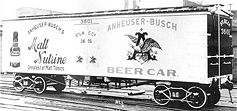 A pre-1911 "shorty" reefer bears an advertisement for Anheuser-Busch's Malt Nutrine tonic. The product was discontinued in 1942.
A pre-1911 "shorty" reefer bears an advertisement for Anheuser-Busch's Malt Nutrine tonic. The product was discontinued in 1942.
Prior to its acquisition by InBev, the company was known in the United States for its advertising presence, including a sports marketing division which creates advertising material for the Super Bowl and many other sporting events. Budweiser has sponsored horse racing events and motor sports including NASCAR and the "Budweiser King" championship top fuel dragster of Kenny Bernstein.
Busch television campaigns have included:[citation needed]
- Clydesdales, used both at liberty and being driven in harness, such as:
- The Budweiser Clydesdales pulling traditional beer wagons
- The traditional holiday spot featuring the Clydesdales pulling a sleigh through a snowy town, concluding with a closeup of a wreath on a door.
- Clydesdales playing American football (with a couple cowboys as the audience, and a zebra for a referee)
- A donkey that thinks he's a horse and wants to be one of the Budweiser Clydesdales
- A Clydesdale foal, who dreams of making the hitch, pretending to pull the beer wagon, which is secretly being pushed from behind by his Clydesdale parents.
- Dalmatians, also associated with the traditional Budweiser Clydesdale iconography
- The "Gimme a light" spots;
- "You can call me Ray, or you can call me Jay" (as referenced in Being There and The Simpsons)
- Frogs saying "Bud-weis-er." The ad campaign later spawned additional characters: Louie and Frankie the chameleons and an inept ferret hit man.
- The annual Bud Bowl.
- The "Waazzzup" series.
- The "Real American Heroes/Real Men of Genius" series of humorous radio and television ads.
- In the past they have marketed their beer through the name NASCAR Busch Series and on Darrell Waltrip's #11 Chevy Monte Carlo, Ricky Craven's #25 Chevy Monte Carlo (Then #50), Dale Earnhardt Jr's #8 Chevy Monte Carlo, and then passed on to Kasey Kahne's #9 Dodge Charger (Ford Fusion in 2010). Currently they sponsor Kevin Harvick's #29 Chevy Impala for the first 20 races of the 2011 NASCAR Sprint Cup Series Season as well as numerous campaigns in the NHRA such as The Big Bud Shootout at the US Nationals and major sponsorship with Kenny Bernstein Racing
- Bud Man is an advertising character for Budweiser beer. He is a superhero and appears on many products aimed at coeds on University campuses. He also inspired Duffman, a character on The Simpsons.
- In the UK when Budweiser became the sponsor of the English Premier League, a humorous series of ads involved the subsequent (fictional) 'Americanisation' of the game, including such ideas as giving the teams more exciting names (The Portsmouth Pirates) and the merging of longtime rival teams Manchester City and Manchester United into one Team Manchester, all with the tagline "you do the football, we'll do the beer". A-B is sponsor of the St Louis (formerly Busch) Soccer Club and, until 2009, owned the Anheuser-Busch Center in suburban Fenton. The latter has a 10,000-seat soccer park that hosts the Missouri state championships. The facilities are now owned and operated by the St. Louis Athletica women's professional soccer team. The professional team plays there, along with area club and high school teams.
- Current television commercials use the slogan "King of Beers"
- A widely-known "This Bud's for you" ad campaign
The company has long been known for its jingles. A few of them are:[citation needed]
- "Here Comes the King" - heard annually over Christmas ads featuring Clydesdales
- "When You Say Budweiser, You've Said It All"
- "Cub Fan, Bud Man" - a Blues Brothers homage (based on their version of "Soul Man") done by Harry Caray for WGN-TV broadcasts of Chicago Cubs games
- "There Is a Tavern in the Town" - old song with wording changes including "Busch" instead of "wine"
- "Under the Anheuser Bush" (an early 1900s popular recording)
Since the acquisition by InBev, significant changes in advertising plans have been rolled out, predicated on the belief that "changing demographics and media habits no longer require spending as much on mainstream sports events":[8]
- A-B is cutting its television advertising budget for the U.S. broadcast of the 2010 Winter Olympics and the 2012 Summer Olympics and "won't seek to be the exclusive beer advertiser" for those events
- dropping Omnicom Group's Goodby, Silverstein & Partners, and other advertising agencies "responsible for some of its best-known past ads"
- paying by the project rather than an annual lump sum
- reducing the annual number of new advertisements from 100 to 50-60.
Environmental record
In 2002, the Political Economy Research Institute ranked Anheuser–Busch 40th among the "Toxic 100", a list of U.S. corporations most responsible for air pollution. The study found that Anheuser–Busch released 1,002,786 kg (2,213,657 lbs) of toxic pollutants annually into the air.[31] This is mainly because large amounts of CO2 are released during the process of fermentation.
Anheuser-Busch has received numerous awards for its efforts to reduce its impact on the environment.[32] In 1995 Anheuser-Busch's Baldwinsville brewery won an award for pollution prevention from the New York Governor for its use of a "comprehensive, energy-producing pollution-prevention system - bioenergy recovery - to treat wastewater from the brewing process." The brewery also reduced solid waste by nearly 70 percent from 1990 to 1994. In addition, the Baldwinsville brewery found markets for previous "waste" materials used in the fermentation of Anheuser-Busch beers.[33] The Anheuser-Busch Recycling Corp. recycled more than 27 billion cans in 2006, a number far greater than what was used in its own packaging. Similarly, Anheuser-Busch has set short-term goals to reduce energy consumption 5% and increasing use of renewable fuel from 8 to 15% by 2010. Along with these goals, Anheuser-Busch has succeeded in cutting down its water use by 3 % since 2002.[34] Anheuser-Busch is investigating several other renewable energy possibilities such as biomass, wind, solar, and landfill gas as a fuel to reduce the company's environmental impact. The Corporation has also made commitments to decrease its greenhouse gas emissions "by 5 percent from its 2005 baseline by 2010 as part of its membership in the U.S. Environmental Protection Agency's Climate Leaders program."[35]
The brewery also operates an environmental outreach program to encourage recycling, energy conservation, and habitat preservation, as well as to prevent littering and water pollution.[36] For past 18 years Anheuser-Busch employees have participated in "Green Week", which focuses on environmental conservation education for employees and their families.[35]
Anheuser-Busch states they do not use animal derived products, artificial ingredients, additives or preservatives at any stage of the brewing process or as part of the packaging in any of their range, with the exception of three Michelob products and two Bud Light products, which contain honey and shellfish respectively, and are marketed as such.[37] All other Anheuser-Busch beers are brewed using water, yeast, barley malt, hops, and additional cereal grains. Anheuser-Busch eliminates the need for isinglass finings by settling and removing particles before fermentation. The beechwood aging process also helps to attract and remove yeast from the brew before the lagering process has ended.[38][39] This only applies to the beers the company brews itself.
Additional subsidiaries
Anheuser-Busch subsidiaries include:[40]
- Anheuser-Busch Agricultural Operations: Produces and enhances the incoming quality of raw materials for the company's beers.
- St. Louis Refrigerated Car Co.: Manages rail/truck transload operation and other properties in St. Louis. This subsidiary was established on February 3, 1878 as Anheuser-Busch's first subsidiary to facilitate large-scale distribution of the company's products via the U.S. rail network as part of A-B's decision to promote Budweiser as a nationwide beer brand.
- Manufacturers Railway Co.: Provides terminal rail-switching services to south St. Louis industries. Its two trucking subsidiaries provide delivery of cans, bottles and outbound beer for four Anheuser-Busch breweries.
- Anheuser-Busch Recycling Corp.: One of the world's largest recyclers of used aluminum beverage containers.
- Eagle Packaging, Inc.: Provides liner material for both the crowns and closures used in Anheuser-Busch packaging.
- Busch Properties, Inc.: Operates resort, residential and commercial properties.
Other business relationships
Owens-Illinois supplies glass bottles to many of the Anheuser-Busch breweries around the world including a brand new plant in Windsor, Colorado. Anheuser-Busch bought Longhorn Glass, a former Anchor Hocking Glass plant providing glass for the Houston Brewery, and has partnered with O-I to make glass bottles for A-B in several other cases.
Anheuser-Busch distributes Borba Skin Balance Water, Monster Energy, Lost Energy, Rumba Energy, and Icelandic Glacial spring water.[citation needed]
St. Louis Cardinals
The St. Louis Cardinals baseball club were owned by Anheuser-Busch from February 20, 1953 until the club was sold to a group of private investors on March 21, 1996. Busch Memorial Stadium, paid for and built by the brewery in the mid-1960s, was recently demolished and replaced by a new ballpark. Anheuser-Busch signed an agreement for the new ballpark to retain the "Busch Stadium" name on the new building through 2025.
Wholesalers and distributors
Anheuser-Busch delivers its products to retailers through a large network of wholesalers and distributors.[41] In the United States, there are about 800 of these;[42] One of the largest is Hensley & Co. in Phoenix, Arizona, with yearly sales of over 20 million cases of Anheuser-Busch beers,[42] and whose chair is Cindy Hensley McCain, the wife of the Republican Presidential nominee for 2008, Senator John McCain of Arizona. The Gaudio family of Illinois hold the longest running wholesalers for Anheuser-Busch, dating back from 1904. Charles Gaudio started an association with Anheuser-Busch as a distributor in a southern Illinois town called Benld. Earl Gaudio, of Danville, IL celebrated 100 years of family ownership with Anheuser-Busch in 2004. He built his wholesaler in 1956. A. Gaudio, Earl's nephew, presides over the Jacksonville, IL distributorship. When he retired from baseball after the 1968 Season, former New York Yankees and St. Louis Cardinals outfielder, Roger Maris was given a distributorship based in Gainesville, FL by August A. Busch, Jr..
The Lewis Bear Company in Pensacola, FL has records dating back to October 1891 with Anheuser-Busch, establishing the longest standing relationship between the brewer and a wholesaler. In 1991, they were recognized by Anhueser-Busch for their 100 years of continued service, and awarded a bronze eagle to signify its importance.
Corporate leadership
Dave Peacock is the current president and CEO of Anheuser-Busch Companies (2008–2009).[25] Luiz Fernando Edmond is the Zone President for Anheuser-Busch InBev's North American Zone (Peacock reports to him). He was appointed by InBev to head the zone in 2008 and came to St. Louis from South America.
A chronology of past corporate leaders (President and CEO) is as follows:
- 1860–1880 Eberhard Anheuser predecessor company E. Anheuser & Co.
- 1880–1913 Adolphus Busch incorporated Anheuser-Busch in 1875
- 1913–1934 August A. Busch, Sr.
- 1934–1946 Adolphus Busch III
- 1946–1971 August A. "Gussie" Busch, Jr.
- 1971–1974 Richard A. Meyer
- 1974–2002 August A. Busch III
- 2002–2006 Patrick Stokes
- 2006–2008 August A. Busch IV
- 2008–2008 Dave Peacock
- 2008–present Luiz Fernando Edmond
See also
Notes
- ^ "Welcome to Anheuser-Busch". Anheuser-Busch. Retrieved on August 18, 2009.
- ^ a b c d Jackson, Michael (1977). The World Guide to Beer, pp.210-11. New York:Ballantine. ISBN 0894712926
- ^ a b Rhodes, Christine P. (1995). The Encyclopedia of Beer, p.49-53. New York: Henry Holt & Co. ISBN 0-8050-3799-3.
- ^ Salter, Jim. Busch family touched by scandal, tragedy. MSNBC via Associated Press. Dec 25 2010. Retrieved 2011-3-13.
- ^ Sanford Wexler, "From Soap Suds to Beer Suds: How Anheuser-Busch became the Largest Brewer in the World," Financial History, Dec 2002, Issue 77, pp 30-34
- ^ Chura, Hillary. A-B cranks up Michelob ads, accents Light. Advertising Age. July 17 2000. Retrieved 2011-3-14.
- ^ Anheuser-Busch celebrates anniversary of Prohibition repeal. Jacksonville Business Journal. April 7 2006. Retrieved 2011-3-14.
- ^ a b c d Kesmodel, David; Vranica, Suzanne (April 29, 2009). "Unease Brewing at Anheuser As New Owners Slash Costs". Wall Street Journal. http://online.wsj.com/article/SB124096182942565947.html. Retrieved 2009-04-30.
- ^ InBev Proposes Combination with Anheuser-Busch. Press release. InBev
- ^ "InBev: U.S. Anheuser Breweries to Stay After Merger". Reuters (The New York Times). 2008-06-20. http://www.nytimes.com/reuters/business/business-inbev.html. Retrieved 2008-06-20.[dead link]
- ^ Jagger, Suzy (2008-06-25). "Anheuser-Busch set to snub InBev and propose own revamp". London: The Times. http://business.timesonline.co.uk/tol/business/industry_sectors/consumer_goods/article4215711.ece. Retrieved 2008-06-25.
- ^ "InBev pitches buyout bid to Bud shareholders". Associated Press. MSNBC. 2008-07-01. http://www.msnbc.msn.com/id/25472139/. Retrieved 2008-07-01.
- ^ "Anheuser-Busch calls InBev takeover bid illegal". Associated Press. Business Week. 2008-07-08. http://www.businessweek.com/ap/financialnews/D91PU0BO2.htm. Retrieved 2008-07-09.
- ^ "Anheuser-Busch, Brazilian Belgian firm InBev are brewin' up a merger". Associated Press. New York Daily News. July 13, 2008. http://www.nydailynews.com/news/us_world/2008/07/13/2008-07-13_anheuserbusch_belgian_firm_inbev_are_bre.html. Retrieved 2008-07-14.
- ^ De la Merced, Michael J. nytimes.com, Anheuser-Busch Agrees to Be Sold to InBev. The New York Times. 2008-07-14.
- ^ Spain, William; Goldstein, Steve. Anheuser-Busch accepts $52 billion InBev offer. MarketWatch. 2008-07-14.
- ^ "Small number laid off today at Anheuser-Busch InBev". St. Louis post Dispatch. January 15, 2010. http://www.stltoday.com/blogzone/lager-heads/uncategorized/2010/01/small-number-laid-off-today-at-anheuser-busch-inbev/. Retrieved 2010-02-06.[dead link]
- ^ a b c d Cecil McKithan and Stephen Lissandrello (April, 1978) (PDF). National Register of Historic Places Inventory-Nomination: Anheuser-Busch Brewery. National Park Service. http://pdfhost.focus.nps.gov/docs/NHLS/Text/66000945.pdf. Retrieved 2009-06-22 and Accompanying four photos, from 1895, ca. 1900, 1942, and ca. 1970PDF (1.90 MB)
- ^ "National Register Information System". National Register of Historic Places. National Park Service. 2008-04-15. http://nrhp.focus.nps.gov/natreg/docs/All_Data.html.
- ^ a b "Anheuser-Busch Brewery". National Historic Landmark summary listing. National Park Service. http://tps.cr.nps.gov/nhl/detail.cfm?ResourceId=715&ResourceType=District. Retrieved 2008-06-28.
- ^ Times Online: Stag Brewery to close with loss of 180 jobs
- ^ a b Grupo Modelo Appoints Anheuser-Busch as the Importer of its Brands in China, Anheuser-Busch Press Release, 2006. Retrieved 2008-3-24.
- ^ a b Anybody Watching Redhook’s Stock…, What's on tap? Newsletter. Retrieved 2008-3-24.
- ^ A-B收购哈啤99.77%股份 哈啤将申请暂停股份买卖_商业频道
- ^ a b St. Louis Commerce, Jul-Aug 2009, Issue 4
- ^ "Hot melon in your beer? Bud tests additives", January 25, 2007, MSNBC.com
- ^ "A booze buzz for teenyboppers?", March 30, 2007, MSNBC.com
- ^ "Anheuser-Busch's "Spykes" Labels Illegal, Group Says"
- ^ "Anheuser-Busch Pulls "Spykes" - CBS News". www.cbsnews.com. May 18, 2007. http://www.cbsnews.com/stories/2007/05/18/national/main2824509.shtml. Retrieved 2009-12-22.
- ^ Listed at Anheuser-Busch.com under "beer brands"
- ^ Political Economy Research Institute
- ^ Anheuser-Busch Environmental, Health & Safety Report
- ^ "NYS Governor's Awards for Pollution Prevention - Anheuser-Busch". Retrieved May 6, 2008
- ^ "Anheuser-Busch To Make Green Beer". Retrieved May 6, 2008
- ^ a b "Anheuser-Busch Employees Seeing Green" "Corporate Social Responsibility Newswire" April 11, 2008. Retrieved May 6, 2008
- ^ Anheuser-Busch Environmental Outreach.
- ^ Anheuser-Busch: Has Some Vegan Options. Barnivore.com. Feb 2011. Retrieved 2011-3-11.
- ^ Barnivore - Your online drink directory
- ^ Vegetarian beers
- ^ Anheuser-Busch - Business Units
- ^ "Anheuser-Busch Wholesalers – Beer Distributors". Anheuser-Busch. http://www.rumbaenergy.com. Retrieved 2008-03-07.
- ^ a b "About Hensley". Hensley & Co.. Archived from the original on February 26, 2008. http://web.archive.org/web/20080226142314/http://www.abwholesaler.com/hensley/AboutUs/AboutUs. Retrieved 2008-03-06.
External links
- Anheuser-Busch website
- Anheuser-Busch Brewery, Broadway & Pestalozzi, Saint Louis, St. Louis City County, MO 3 photos, 2 data pages, at Historic American Building Survey
- Anheuser-Busch Web Page on the St. Louis Brewery Tour
Anheuser–Busch InBev Corporate Directors: Carlos Brito, CEO • August Busch IV • Allan Chapin • Carlos Alberto da Veiga Sicupira • Arnoud de Pret Roose de Calesberg • Jean-Luc Dehaene • Philippe de Spoelberch • Jorge Paulo Lemann • Roberto Moses Thompson Motta • Kees J. Storm • Peter Harf •Subsidiaries Equity Investments Grupo Modelo - 50% • Craft Brewers Alliance (Redhook, Widmer Bros., Kona Brewing) - 32.2% • Tsingtao Brewery - 7%Global and
multi-country brandsAlexander Keith's • Beck's • Brahma • Budweiser (except the Czech Republic) • Stella Artois • Hoegaarden • LeffeLocal brands Antarctica • Aqua Fratelli Vita • Astika • Baisha • BagBier • Bass • Belle-Vue • Boddingtons • Bohemia • Boomerang • Borostyán • Breda Royal Beer • Busch Beer • Carcau • Chernigivske • Diebels • Diekirch • Dimix • Dommelsch • Double Deer • Dutch Gold • Franziskaner • Gilde Ratskeller • Guaraná Antarctica • Haake-Beck • Harbin Brewery • Hasseröder • Hertog Jan • Hoegaarden • Jinlin • Jinlongquan • Julius • Jupiler • KK • King Cobra • Klinskoye • Kokanee • La Bécasse • Labatt • Lakeport • Liber • Löwenbräu • Marathon • Michelob • Mousel • Natural • Oranjeboom • Paceña • Permskoye Gubernskoye • Quilmes • Red Shiliang • Rifey • Rolling Rock • Rogan • Safir • Santai • Sedrin • Sibirskaya Korona • Skol • Spaten • St. Pauli Girl • Sukita • Taller • Tolstiak • Verboden Vrucht • Vieux Temps • Yali • Yantar • Zizhulin • Zhujiang
Principal owners of the St. Louis Cardinals franchise Chris von der Ahe • Frank & Stanley Robison • Helene Hathaway Britton • Sam Breadon • Robert E. Hannegan & Fred Saigh • Fred Saigh • Gussie Busch • Anheuser-Busch • Bill DeWitt, Jr.Categories:- Historic districts in Missouri
- Anheuser-Busch
- Busch family
- Amusement park companies
- Beer and breweries in multi regions
- Beer brewing companies based in St. Louis, Missouri
- Companies based in St. Louis, Missouri
- Companies established in 1852
- Companies formerly listed on the London Stock Exchange
- Eclipse Award winners
- Anheuser-Busch InBev
Wikimedia Foundation. 2010.

